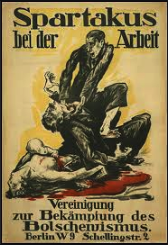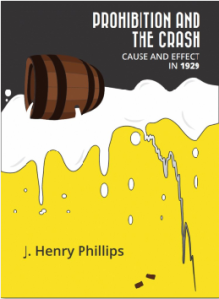Volstead Act World War III, 1-4
 |
| Typical German poster in 1919 (link) |
INDUSTRIAL ALCOHOL.
Sec. 1. When used in this title—
The term “alcohol” means that substance known as ethyl alcohol, hydrated oxide of ethyl, or spirit of wine, from whatever source or whatever processes produced.
The term “container” includes any receptacle, vessel, or form of package, tank, or conduit used or capable of use for holding, storing, transferring, or shipment of alcohol.
INDUSTRIAL ALCOHOL PLANTS AND WAREHOUSES.
Sec. 2 Any person now producing alcohol shall, within thirty days after the passage of this Act, make application to the commissioner for registration of his industrial alcohol plant, and as soon thereafter as practicable the premises shall be bonded and permit may issue for the operation of such plant, and any person hereafter establishing a plant for the production of alcohol shall likewise before operation make application, file bond, and receive permit.
Sec. 3. Warehouses for the storage and distribution of alcohol to be used exclusively for other than beverage purposes may be established upon filing of application and bond, and issuance of permit at such places, either in connection with the manufacturing plant or elsewhere, as the commissioner may determine; and the entry and storage of alcohol therein, and the withdrawals of alcohol therefrom shall be made in such containers and by such means as the commissioner by regulation may prescribe.
Sec. 4. Alcohol produced at any registered industrial alcohol plant or stored in any bonded warehouse may be transferred under regulations to any other registered industrial alcohol plant or bonded warehouse for any lawful purpose.
***
The wartime version of the Volstead Act had been in effect since mid-1919 as a sort of test to see how far Americans can be pushed toward a Centrally Planned Economy.
Russia had just such a law beginning after China's 1911 opium ban caused a glut in the Balkans out of which WW1 emerged as competition for primacy in drug markets. American alcohol prohibition took effect in summer, 1919. The Czar had been murdered the previous, year, after six years of alcohol prohibition. Congress was understandably alarmed, but not so much as following the Soviet debt repudiation announced six months earlier. After all, Russia's revolution and the separate peace of March 1918 forced the USA to resort to conscription and enter the war lest the Allies lose to Germany and default on their war loans. Imagine the embarrassment if alcohol prohibition were to topple the Czar and lose the war triggered by American efforts to defuse a boycott by making China's drug prohibitions a worldwide encumbrance!
Only much later would it surface that industrial alcohol accounted for a tiny fraction of illegal liquor. What bothered voters was the continued addition of mutilating deadly poison to industrial alcohol used for such things as fuel and reagents. Before prohibition, with unpoisoned alcohol readily avaliable, resentment of deliberate government poisoning of citizens was not widespread.
***
Find out the juicy details behind the mother of all economic collapses. Prohibition and The Crash–Cause and Effect in 1929 is available in two languages on Amazon Kindle, each at the cost of a pint of craft beer.

Brazilian Sci-fi from 1926 featuring the usual beautiful daughter of a scientist touting prohibition and racial collectivism in America’s Black President 2228 by Monteiro Lobato, translated by J Henry Phillips (link)

Brazilian blog…
American libertarian blog…
Tagged: prohibition, confiscation, asset forfeiture, initiation of force, blackouts, energy crisis, liquidation, liquidity, bankruptcy, Crash, Depression, communism, inviting attack, treason, economic collapse,




Comments
Post a Comment